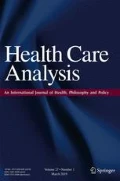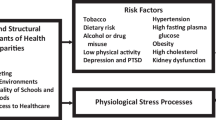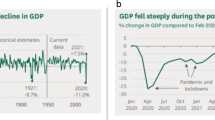Abstract
By comparing models of market-based allocation with state-controlled national health care systems, it will be suggested that the way in which different communicaties deal with the allocation of health care is central to their expression of what might be called a moral self-understanding. That is to say that the provision of health care may be expected to be a focus of communal debate, not simply about morally acceptable and unacceptable actions, but also about the community’s understanding of what it is that makes for a worthwhile and morally defensible human life. This moral self-understanding is seen to be entwined with the different concepts of ‘health’ that are implicit in different systems of allocation. In conclusion, it will be suggested that decisions concerning health care allocation must be made in response to a continuing, public and open debate about that health and health care mean to a particular community.
Similar content being viewed by others
References
Fleck, L.M. (1994). Just caring: health reform and health care rationing.The Journal of Medicine and Philosophy 19, 435–443.
Nozick, R. (1974).Anarchy, State and Utopia, Blackwell, Oxford.
Moffit, R.E. (1994). Personal freedom and responsibility: the ethical foundations of a market-based health care reform.The Journal of Medicine and Philosophy 19, 471–481.
Fleck, L.M. (1990). Justice, HMOs, and the invisible rationing of health care resources.Bioethics 4, 97–120.
Seedhouse, D. (1986).Health: The Foundations for Achievement, John Wiley, Chichester.
Spicker, S.F. (1995). Going off the dole: a prudential and ethical critique of the ‘healthfare’ state. In,Reforming Health Care: The Philosophy and Practice of International Health Care Reform, ed. by D. Seedhouse, John Wiley, Chichester.
Daniels, N. (1985).Just Health Care, Cambridge University Press, Cambridge.
Strosberg, M.A.et al. (1992).Rationing America’s Medical Care: The Oregon Plan and Beyond, Brookings Institution, Washington DC.
Gallie, W.B. (1956). Essntially contested concepts.Proceedings of the Aristotelian Society 56, 167–198.
Habermas, J. (1990). Discourse ethics: notes on a program of philosophical justification. In,Moral Consciousness and Communicative Action, Polity Press, Cambridge.
Author information
Authors and Affiliations
Rights and permissions
About this article
Cite this article
Edgar, A. Health care allocation, public consultation and the concept of ‘Health’. Health Care Anal 6, 193–198 (1998). https://doi.org/10.1007/BF02678104
Issue Date:
DOI: https://doi.org/10.1007/BF02678104




